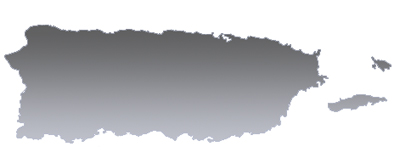PUERTO RICO, OVERVIEW
Constitutionally, Puerto Rico is an unincorporated territory of the United States that was granted self-government by Congress in 1952 relating to areas of local concern. Puerto Rico is subject to most federal legislation enacted by Congress, the main exception being federal taxation.
Puerto Rico's government is republican in form, with a governor and two legislative chambers, elected every four years. Puerto Rico's 72 municipalities also have varying degrees of self-government over some local matters. Puerto Rico's executive power is exercised through a myriad of departments and agencies, the most formidable being Hacienda (Treasury), The Planning Board, ARPE (Administration of Rules and Permits), the Labor Department, and the Environmental Quality Board.
Court of law jurisdiction in Puerto Rico is divided between the U.S. District Court, and the Courts of the Commonwealth of Puerto Rico. The U.S. District Court has diversity and federal question jurisdiction, and appeals are to the Court of Appeals for the First Judicial Circuit in Boston. Commonwealth courts have general jurisdiction, and appeals are to Puerto Rico's Circuit Courts of Appeal, and then to Puerto Rico's Supreme Court.
Commonwealth courts hold only bench trials in civil cases in Spanish. Rules of evidence and procedure are based on the federal rules. All proceedings in the U.S. District Court are in English. Attorneys from the mainland may appear pro hac vice in both court systems.
Puerto Rican residents and Puerto Rico Corporations are exempt from federal income taxes for locally generated income, but are subject to Commonwealth income tax and a local sales tax (IVU).
Corporations and business are also subject to Commonwealth property taxes, and to franchise taxes paid to municipalities. Nonresidents generating income in Puerto Rico are also subject to federal income taxes, but receive a credit for income taxes paid locally. Foreign corporations (including U.S. corporations) deriving income in Puerto Rico are subject to Puerto Rico income and sales taxes if their businesses do not enjoy tax exemption. Legislation provides for grants of local tax exemption depending upon the industry in which they are engaged.
